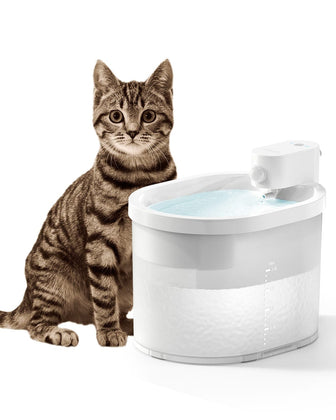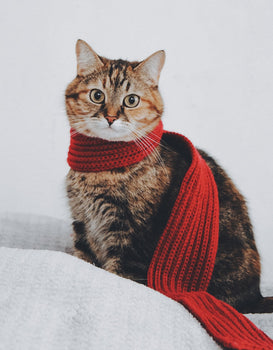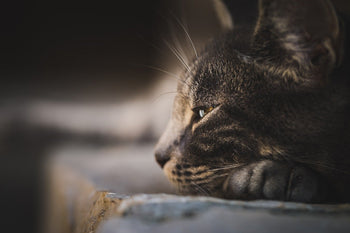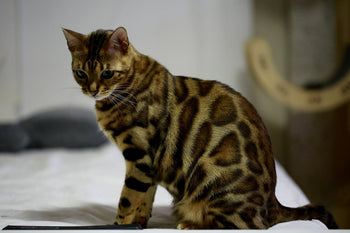Cats are known for their peculiar behavior, and one of the more common habits that cat owners encounter is their cat licking their faces. While some owners may find it endearing, others may find it annoying or even gross. Regardless of one's opinion, the question remains: why does my cat lick my face?
The answer to this question lies in the instinctual nature of cats. Licking is a grooming behavior that cats use to keep themselves clean and healthy. When a cat licks their owner's face, they are essentially grooming them, which is a sign of affection and bonding. However, there may be other reasons why a cat licks their owner's face, such as communication and marking territory.
Understanding why cats lick their owner's face can help owners better understand their cat's behavior and strengthen the bond between them. In this article, we will explore the various reasons why cats lick their owner's face and what it means for their relationship.
Why Does My Cat Lick My Face: Understanding Your Feline's Behavior

Key Takeaways
Cats lick their owner's face as a sign of affection and bonding, as well as a grooming behavior.
Licking can also be a form of communication and marking territory.
Understanding why cats lick their owner's face can help strengthen the bond between them.
The Instinctual Nature of Cats
Cats are fascinating creatures that exhibit many unique behaviors. One of these behaviors is licking their owners' faces. While this may seem strange to some, it is actually a natural instinct for cats. Understanding the reasons behind this behavior can help cat owners better understand their feline friends.
Natural Grooming Behavior
Cats are known for their fastidious grooming habits. They spend a significant amount of time each day grooming themselves. This behavior is not just about keeping themselves clean; it is also a way for cats to regulate their body temperature and distribute natural oils throughout their fur. Licking is a natural grooming behavior that cats use to clean themselves and their fellow felines.
Licking as a Cleaning Method
When a cat licks its owner's face, it is essentially trying to clean them. Cats view their owners as part of their family group and want to keep them clean, just like they would with their fellow felines. Licking is also a way for cats to bond with their owners and show affection.
Grooming and Health
While licking may be a natural behavior for cats, it is important to note that excessive licking can be a sign of an underlying health issue. For example, if a cat is licking its owner's face excessively, it may be a sign of anxiety or stress. Additionally, if a cat is grooming itself excessively, it may be a sign of an underlying skin condition or other health problem. If you notice your cat exhibiting excessive grooming behaviors, it is important to consult with a veterinarian.
Related Posts:
Affection and Bonding
Licking as a Sign of Affection
Cats show affection in their own unique way, and licking is one of them. When a cat licks their owner's face, it can be a sign of love and affection. This behavior is often seen in cats that have a close bond with their owners. Licking is a way for cats to show their affection, and it is a behavior that is often learned from their mothers.
Social Group Acceptance
Cats are social animals, and they have a strong need for social interaction. Licking is a way for cats to bond with their owners and to show acceptance into their social group. When a cat licks their owner's face, it is a way for them to show that they consider their owner as part of their social group.
Endorphins and Positive Association
Licking can also be a pleasurable experience for cats. When a cat licks their owner's face, it can release endorphins, which can create a positive association with the act of licking. This positive association can lead to the cat repeating the behavior, as they enjoy the feeling that it brings.
In summary, cats lick their owner's face as a sign of affection and bonding. This behavior is learned from their mothers and is a way for cats to show social group acceptance. Licking can also release endorphins, which can create a positive association with the behavior.

Communication and Marking Territory
Cats use a variety of ways to communicate with their owners and other felines. One of the ways they communicate is by licking their owner's face. This behavior can be puzzling to cat owners, but it is a way for cats to convey certain messages to their human companions.
Scent Glands and Scent Transfer
Cats have scent glands in various parts of their bodies, including their cheeks, forehead, and chin. When a cat licks their owner's face, they are transferring their scent to their owner. This scent transfer is a way for cats to communicate with their owners and mark them as part of their territory.
Scent Marking and Territory
Scent marking is an important way for cats to communicate with other cats and mark their territory. When a cat licks their owner's face, they are marking them as part of their territory. This behavior is more common in cats that are particularly attached to their owners and see them as part of their family.
Claiming Ownership
When a cat licks their owner's face, they are also claiming ownership of their owner. This behavior is more common in cats that are particularly possessive of their owners and see them as their property. While this behavior can be cute and endearing, it is important for cat owners to set boundaries and discourage possessive behavior in their cats.
Overall, licking is a form of communication and scent marking for cats. While it may seem strange to humans, it is a natural behavior for cats and serves an important purpose in their social interactions.
Conclusion
In conclusion, cats are complex creatures with various behavioral patterns. One of these behaviors includes licking their owner's face. While it may seem strange to some, it is a sign of affection and trust.
Furthermore, cats use their sense of smell to communicate and recognize their owners. Licking the face allows them to pick up scents and tastes, which they can associate with their owners.
It is important to note that excessive licking or aggressive behavior should be monitored and addressed by a veterinarian. This behavior may be a sign of underlying medical conditions or stress.
Overall, licking is a natural behavior for cats, and it is their way of showing affection and trust towards their owners. As long as it is not excessive or aggressive, it should be embraced as a positive aspect of the human-cat bond.

Frequently Asked Questions
What does it signify when my cat licks my face while purring?
Cats usually lick their owners as a sign of affection and bonding. When a cat licks your face while purring, it is a way of showing that they trust and love you. It is also a way of marking you with their scent, which is a way of claiming you as their own.
Is it safe and hygienic to allow my cat to lick my face?
While cats are generally clean animals, allowing them to lick your face can pose some health risks. Cats carry bacteria in their mouths that can be harmful to humans, and their saliva can cause skin irritation and infections. It is best to avoid letting your cat lick your face, especially if you have any open wounds or compromised immune system.
What are the reasons behind my cat licking my face excessively?
Excessive licking can be a sign of stress or anxiety in cats. It can also be a sign of a medical issue, such as dental problems or skin allergies. If your cat is licking your face excessively, it is best to consult with a veterinarian to rule out any underlying health issues.
Can a cat's licking behavior indicate affection similar to kisses?
Yes, a cat's licking behavior can be similar to kisses in humans. It is a way of showing affection and bonding with their owner. However, it is important to remember that cats have different ways of showing affection than humans, and licking is just one of them.
Why might my cat lick my face particularly at night or in the morning?
Cats are nocturnal animals, and they are more active at night. If your cat is licking your face at night or in the morning, it may be because they want your attention or they are hungry. It can also be a way of marking you as their own before they go to sleep.
How can I understand my cat's licking and biting behavior?
Understanding your cat's licking and biting behavior requires observation and patience. Pay attention to your cat's body language and vocalizations to determine their mood and intentions. If your cat is biting or licking excessively, it is best to consult with a veterinarian to rule out any underlying health issues.
















